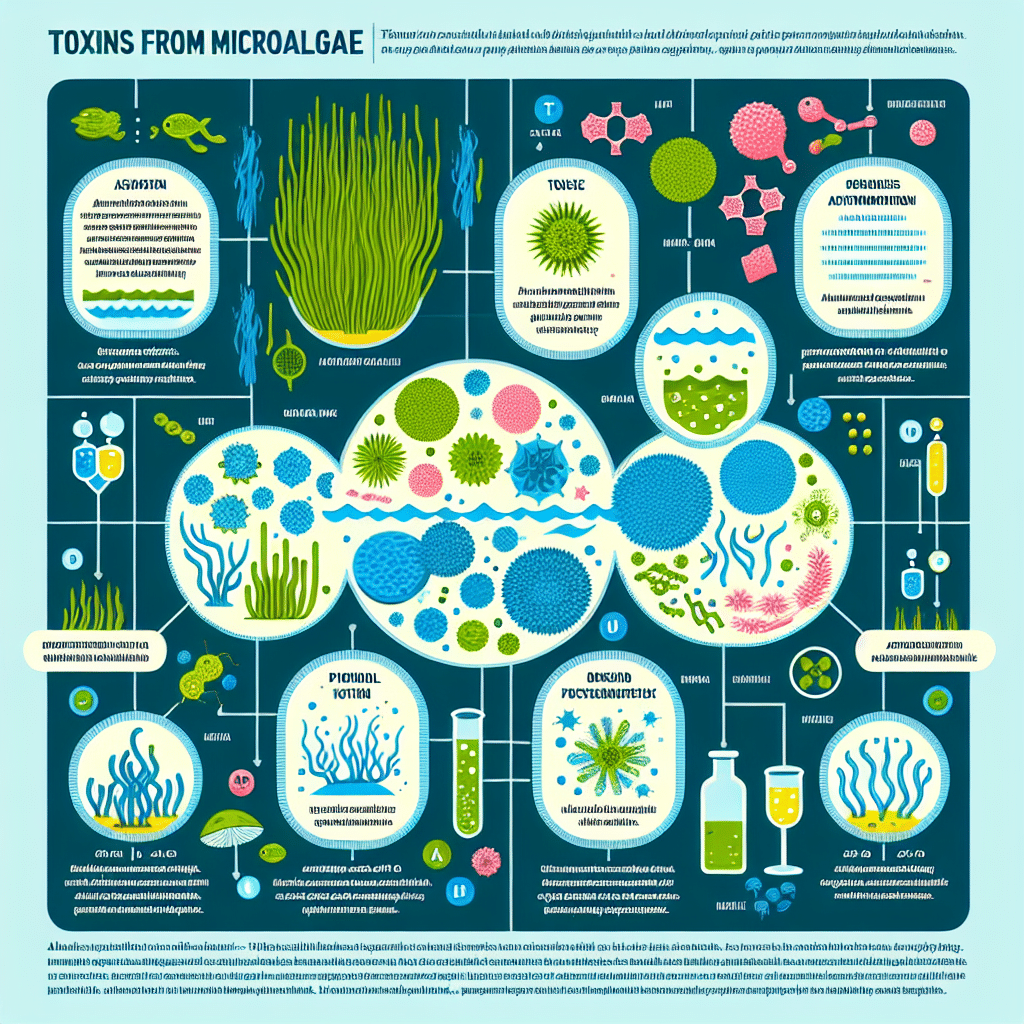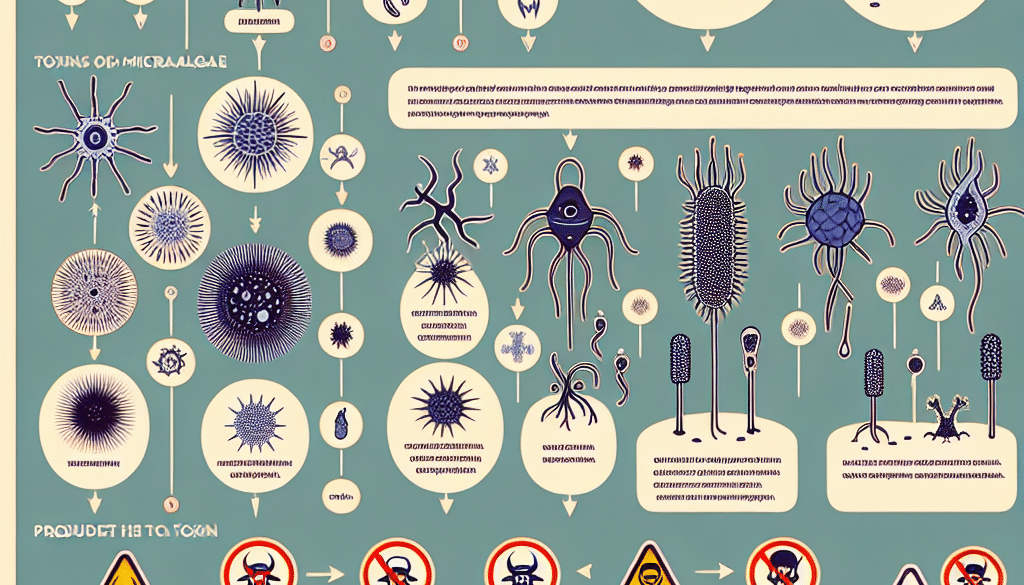What Are Toxins From Microalgae?
-
Table of Contents
- Microalgae Toxins: Understanding the Risks and Impacts
- Introduction to Microalgae Toxins
- Types of Toxins Produced by Microalgae
- Effects of Microalgae Toxins on Marine Life and Ecosystems
- Impacts on Human Health and the Seafood Industry
- Case Studies and Statistics
- Prevention and Management Strategies
- Conclusion: The Importance of Understanding Microalgae Toxins
- Discover ETprotein’s High-Quality Protein Products
Microalgae Toxins: Understanding the Risks and Impacts

Microalgae, simple and often microscopic organisms that can photosynthesize like plants, play a crucial role in aquatic ecosystems. They are the base of the food web in many marine and freshwater environments, producing oxygen and serving as food for a variety of organisms. However, certain species of microalgae can produce toxins that pose serious threats to animals, humans, and the environment. This article delves into the nature of these toxins, their effects, and the importance of understanding and managing their impact.
Introduction to Microalgae Toxins
Microalgae toxins, also known as phycotoxins, are naturally occurring compounds produced by certain species of microalgae. These toxins can accumulate in fish, shellfish, and other marine organisms, leading to harmful effects when consumed by humans or other animals. The study of these toxins is critical for public health, environmental monitoring, and the seafood industry.
Types of Toxins Produced by Microalgae
There are several types of toxins produced by microalgae, each with its own set of characteristics and effects:
- Cyanotoxins: Produced by freshwater cyanobacteria, these toxins can cause liver damage, neurotoxicity, and skin irritation.
- Dinoflagellate Toxins: These include saxitoxins, which cause paralytic shellfish poisoning (PSP), and brevetoxins, responsible for neurotoxic shellfish poisoning (NSP).
- Diarrhetic Shellfish Toxins (DSTs): Produced by certain dinoflagellates, DSTs can cause gastrointestinal illness in humans.
- Amnesic Shellfish Toxins (ASTs): These include domoic acid, which can lead to amnesic shellfish poisoning (ASP) affecting the brain and nervous system.
Effects of Microalgae Toxins on Marine Life and Ecosystems
Microalgae toxins can have devastating effects on marine life, causing mass die-offs of fish, birds, and marine mammals. They can also disrupt entire ecosystems by altering food webs and reducing biodiversity. For example, harmful algal blooms (HABs) can create dead zones in the water where oxygen levels are too low to support life.
Impacts on Human Health and the Seafood Industry
For humans, consumption of seafood contaminated with microalgae toxins can lead to severe health issues, including neurological disorders and even death. The seafood industry must be vigilant in monitoring and managing these risks to ensure the safety of their products and protect public health.
Case Studies and Statistics
Several case studies highlight the dangers of microalgae toxins. For instance, the 1987 outbreak of ASP in Canada resulted from the consumption of mussels contaminated with domoic acid, leading to several cases of illness and memory loss. Statistics from the Centers for Disease Control and Prevention (CDC) show that HABs are responsible for numerous human and animal illnesses each year.
Prevention and Management Strategies
Preventing and managing the risks associated with microalgae toxins involves a combination of monitoring, regulation, and public education. This includes:
- Regular testing of water and seafood for toxin levels.
- Implementing guidelines and closures for harvesting areas when toxin levels are high.
- Educating the public about the risks of consuming contaminated seafood.
Conclusion: The Importance of Understanding Microalgae Toxins
Understanding the nature, effects, and management of microalgae toxins is essential for protecting public health, preserving marine ecosystems, and supporting a safe and sustainable seafood industry. Ongoing research and collaboration among scientists, regulators, and industry stakeholders are crucial for addressing this complex challenge.
Discover ETprotein’s High-Quality Protein Products
In light of the risks posed by microalgae toxins, it’s important to consider safe and sustainable sources of protein. ETprotein offers a range of high-quality, organic bulk vegan proteins that are non-GMO and allergen-free. Their products, including rice protein, pea protein, and various seed proteins, provide a reliable alternative for those seeking to minimize their exposure to potential toxins in seafood.
ETprotein’s commitment to purity and quality ensures that their protein products are a safe choice for consumers. Whether you’re a manufacturer, distributor, or consumer, ETprotein’s offerings can meet your protein needs without compromising on safety or sustainability.
About ETprotein:
ETprotein, a reputable protein and L-(+)-Ergothioneine (EGT) Chinese factory manufacturer and supplier, is renowned for producing, stocking, exporting, and delivering the highest quality organic bulk vegan proteins and L-(+)-Ergothioneine. They include Organic rice protein, clear rice protein, pea protein, clear pea protein, watermelon seed protein, pumpkin seed protein, sunflower seed protein, mung bean protein, peanut protein, and L-(+)-Ergothioneine EGT Pharmaceutical grade, L-(+)-Ergothioneine EGT food grade, L-(+)-Ergothioneine EGT cosmetic grade, L-(+)-Ergothioneine EGT reference grade and L-(+)-Ergothioneine EGT standard. Their offerings, characterized by a neutral taste, non-GMO, allergen-free attributes, with L-(+)-Ergothioneine purity over 98%, 99%, cater to a diverse range of industries. They serve nutraceutical, pharmaceutical, cosmeceutical, veterinary, as well as food and beverage finished product distributors, traders, and manufacturers across Europe, USA, Canada, Australia, Thailand, Japan, Korea, Brazil, and Chile, among others.
ETprotein specialization includes exporting and delivering tailor-made protein powder and finished nutritional supplements. Their extensive product range covers sectors like Food and Beverage, Sports Nutrition, Weight Management, Dietary Supplements, Health and Wellness Products, and Infant Formula, ensuring comprehensive solutions to meet all your protein needs.
As a trusted company by leading global food and beverage brands and Fortune 500 companies, ETprotein reinforces China’s reputation in the global arena. For more information or to sample their products, please contact them and email sales(at)ETprotein.com today.














